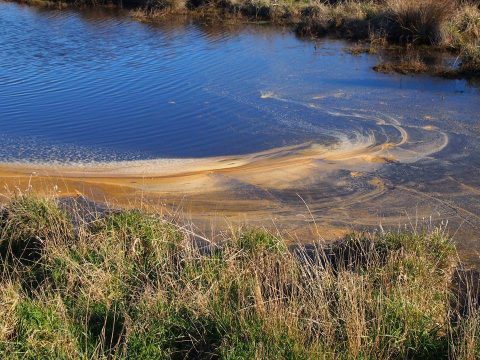Delaying freshwater reform would be a disastrous step backwards and could be the final nail in the coffin for our rivers, lakes and wetlands New Zealand is blessed with water. Fresh water flows from our snow and glacier-clad mountains,...
Delaying freshwater reform would be a disastrous step backwards and could be the final nail in the coffin for our rivers, lakes and wetlands
New Zealand is blessed with water. Fresh water flows from our snow and glacier-clad mountains, through our farms and cities, to the sea. Rivers have deep cultural values and one, the Whanganui, has been recognised as having the rights of a person. For Kiwis, our economy, our health, and our way of life depends on clean water.
 But our dependence on fresh water has not stopped decades of abuse. Now, our rivers and lakes are in serious trouble. On Thursday, a wide-ranging, data-driven report into the state of New Zealand’s rivers, lakes and freshwater ecosystems was released by two government departments, the Ministry for the Environment and Statistics NZ. Their findings, delivered during a nationwide Covid-19 lockdown, couldn’t be more alarming. Our freshwater ecosystems are at breaking point; the damage is overwhelming and in some cases irreversible.
But our dependence on fresh water has not stopped decades of abuse. Now, our rivers and lakes are in serious trouble. On Thursday, a wide-ranging, data-driven report into the state of New Zealand’s rivers, lakes and freshwater ecosystems was released by two government departments, the Ministry for the Environment and Statistics NZ. Their findings, delivered during a nationwide Covid-19 lockdown, couldn’t be more alarming. Our freshwater ecosystems are at breaking point; the damage is overwhelming and in some cases irreversible.
Effluent flowing into a lakeBetween 95% and 99% of rivers in urban, pastoral, and non-native forest areas are heavily polluted; 90% of our precious wetlands have been drained and destroyed; 70% of our native freshwater fish are heading towards extinction.
On top of these disastrous environmental outcomes, the report confirms that New Zealand’s economy, our identity, our cultural values, and our wellbeing depend on the health of the environment.
In failing the environment, we are failing everything we value.
Our utter failure to protect the ecosystems we depend on is a national disgrace and is now a national crisis.
Irrigated land has increased by 100% in only 15 years, mainly to enable dairy farming in areas too dry to otherwise grow grass. Irrigation is now the single biggest water user in New Zealand, accounting for nearly half of all water taken out of the ecosystem. Conversely, at least 1,257 hectares of wetlands were destroyed between 2001 and 2016 to expand “productive” land into areas otherwise too wet.
Climate change, the report warns us, will bring more frequent and longer droughts. Already, soils at a quarter of monitored sites are drying out. Some farming regions and our largest city are still suffering under one of the longest drought periods ever experienced in New Zealand. Yet our banks, government, and agricultural leaders still encourage water-dependent farming systems that cannot succeed, either environmentally or economically. The report warns us, under business as usual, New Zealand will experience food shortages.
We need fresh water, and right now our rivers, lakes, and all the native plants and animals that depend on them urgently need us to protect and restore them. Never has the message been so clear, or so urgent.
But public outrage at the mismanagement of our water has led to hope. After years of painstaking public and industry consultation, the meaningful freshwater management reforms that New Zealand needs are fully developed, and ready to go. The new rules will limit pollution, protect wetlands, and stop excessive water demands. These rules will rescue our rivers. But they haven’t been implemented.
For too long, our environmental management systems and politicians have been captured by outdated ways of thinking about profit margins and costs, while forgetting the immeasurable losses we’re already facing in biodiversity, human health, and cultural wellbeing.
And incredibly, some agriculture industry groups are calling for environmental rules to be delayed – if not ditched entirely. Covid-19, they say, means the environment will have to wait. It appears to be their view that industry can only succeed while harming the world their farming members depend on.
In fact, the Covid-19 crisis has made it even more clear why New Zealand needs strong rules to protect environmental and public health. Diseases that jump from animals to humans, like Covid-19, are commonly spread from farm animals to humans through water – like Giardia, Cryptosporidium, E. coli, and Salmonella to name a few. Four years ago we experienced the world’s largest recorded outbreak of Campylobacter. We must act to ensure such outbreaks cannot and do not happen again because the costs, as we now know, are catastrophic.
Delaying freshwater reform would be a disastrous step backwards for New Zealand and could be the final nail in the coffin for the natural ecosystems in our rivers, lakes, and wetlands which are already at breaking point.
New Zealand, and the planet, needs transformative economic recovery that cares for people and the planet. We need to create a sustainable, ethical way of working and living that protects our natural systems, and in doing so protects us. It is obvious our current system is badly broken, but the solution is at hand. All we need are leaders with the courage to take it.
Tom Kay – Forest & Bird freshwater advocate
This blog post was first printed in The Guardian on 17 April 2020


